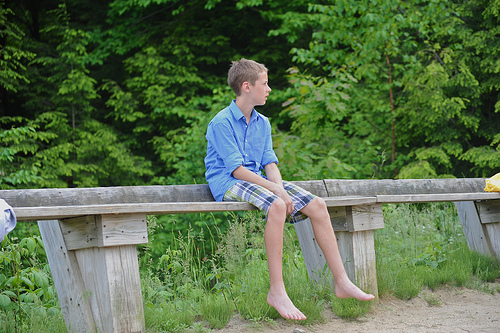
“If you light a lamp for somebody, it will also brighten your path.” ~Buddhist saying
Moving to a new country as a kid can be traumatizing because of the challenges of fitting into a new culture and new social customs.
When I arrived in Northern California at the age of ten with my parents and younger two brothers, we were excited about being in America (home of Disneyland) but apprehensive about our how our classmates would react to us and how we would fit into the social environment of a school in a new country.
My earliest memories of starting school in the 4th grade were not having to wear uniforms like we did in Malaysia, not having to stand up when speaking in class, and not having a regular morning assembly every morning prior to school starting.
I welcomed the slightly relaxed curriculum, reading fun fiction titles in class and not having semester finals in elementary school.
The challenges I found were as expected—not understanding the cultural context of what was happening in the classroom or references to American sports, entertainment, history and even holidays.
It was also difficult fitting in and making friends initially in a close-knit school, where kids had grown up together since pre-school.
Most of my classmates ignored me in the beginning. I found it difficult to engage in team sports activities or find lunchtime friends to visit with. Yes, there was some bullying, as well, about my mismatched, out-of-fashion clothes, my military-ready haircut, and even my accent, but I tried to take that all with good humor!
While I recall eating lunch in solitude for several weeks and attending English as a Second Language classes trying to get accustomed to my new life in America, I did manage to make friends over the course of the school year and fit in. I even started getting invitations to birthday parties by the end of the year.
Here are some ways I was able to fit into my new school. These are ways that you too can fit in at your new university, job, or city.
1. Get to know your surroundings.
In order to assimilate into a new environment, I had to understand my surroundings. My brothers and I spent countless hours watching American classics like The Brady Bunch, Leave it to Beaver, and The Cosby Show to get a better understanding of the cultural and social differences here, and even people’s sense of humor.
Whether you’re in a new city, a new school, or a new job, take the time to explore your surroundings. Try to find out where things are located, who to go to for help, and what the current policies and procedure are.
Talk to people in authority positions or with more experience so they can tell you what you should and shouldn’t do, and what the acceptable social and cultural practices are.
2. Find others who are similar to you or who share your background.
Since it felt like I was alone by myself at my first school in America, I decided to reach out to others who I did have something in common with.
In addition to the one other Asian-American kid at that school who I instantly became friends with, I was also able to reach out to kids who had just moved into the area, other immigrant kids and others who I shared classes with and had gotten to know better.
If you find yourself in a new city or university, search out people from your hometown because you will have many common interests and shared experiences.
At a new job, find colleagues who went to the same university as you or who share a similar professional background. If you’re in a new city, find others in the community that share your interest in running, cycling, playing music, or whatever your passion might be.
3. Be able to laugh at yourself.
In order to avert the negative and culturally insensitive comments by some of the kids, I was able to laugh at myself. I didn’t take the bullies or myself too seriously which helped me feel more comfortable while at school, as I was trying to fit in.
Similarly, in a new work or school environment, give your new classmates and colleagues the benefit of the doubt. If they make comments or remarks that are sensitive to you or hurtful, credit it to ignorance and them not knowing you well enough.
Try if you can to find the humor in what they said and if there’s even a slight hint of truth in it, use it to laugh at yourself. This will help you break the ice and fit in.
4. Embrace new activities and experiences.
New activities and shared experiences have a way of solidifying relationships with others. Participating in the school skit, a poetry contest, and a country-dance competition were activities that I participated in which introduced me to more friends and helped me understand the American culture better.
I doubt I did these activities initially with open arms, but I challenged myself to do something that I had never previously done before.
If you’re starting a new university or school, take yourself out of your comfort zone to try clubs, sports, or activities you might not have tried before. Go to plays, concerts, and lectures that you wouldn’t have attended.
At a new job, reach out and collaborate with others, attend social events with colleagues you don’t know well, and go to the company picnic or holiday party even if you have an aversion to such events.
5. Find mentors and teachers who can help you adjust better.
In my case, I was fortunate enough to have found the English as a Second Language teacher to be from the country I had just arrived from. My English teacher became a mentor, guide, and later, friend.
She helped me navigate through the first year of school, encouraged me when I was uncertain of myself, and helped me get acclimated with the cultural and social differences in the U.S.
A graduating student, teacher, supervisor or local community leader can become your mentor. All you have to do is approach them and ask.
At work, seek out someone with more experience, and ask them to help mentor you with projects during your initial days on the job. In a new city, seek advice from a community leader or even neighbor on how to avoid rush hour, where to do your grocery shopping, and what parts of town to avoid.
Being the “new kid” can be filled with much apprehension, fear, and uncertainty.
Of course, once you’re in the “in,” don’t forget where you came from! Every former “new kid” has an obligation—to help other new kids at school or colleagues on the job fit in to the new environment.
There’s no better way for you to continue to build new friendships and relationships than to welcome others. Just remember, the new kids will forever be grateful for your friendship and kindness.
Photo by Eaglebrook School
About Vishnu
Vishnu is a writer and coach who helps people overcome breakups to rebuild their lives and live with purpose. He blogs at www.vishnusvirtues.com For Vishnu's latest book, 10 Sacred Laws of Healing a Broken Heart, visit his Amazon page here.













 Though I run this site, it is not mine. It's ours. It's not about me. It's about us. Your stories and your wisdom are just as meaningful as mine.
Though I run this site, it is not mine. It's ours. It's not about me. It's about us. Your stories and your wisdom are just as meaningful as mine. 